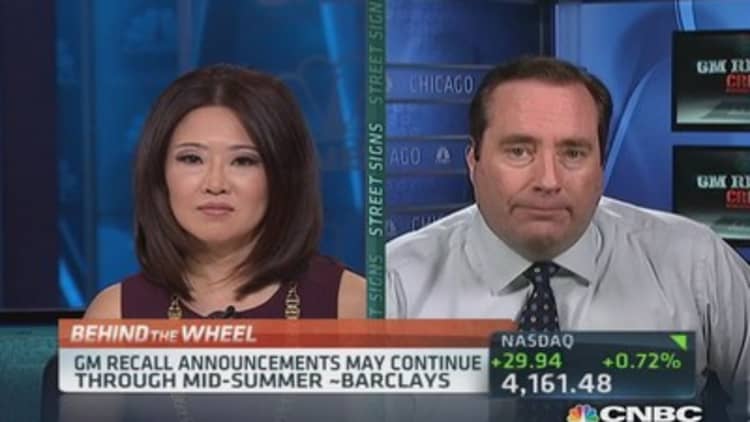General Motors has taken a lot of heat for its much-delayed recall of millions of cars with defective ignition switches. And so has the National Highway Traffic Safety Administration, the government regulatory agency that is supposed to keep dangerous vehicles off the road.
In light of this fiasco, consumer advocates are pressing NHTSA to scrap a policy that limits its access to potentially valuable information that could result in a safety recall.
The NHTSA does not include defect reports from consumer groups, such as the Center for Auto Safety, in its complaint database or its investigatory files. The agency only considers complaints from individual consumers or information provided by auto manufacturers.
"This doesn't make any sense," said Clarence Ditlow, CAS executive director. "If you build a bigger database, you have a bigger universe of complaints to look at and it's easier to spot defects."
In a recent letter to NHTSA, Ditlow noted that his safety group had information about the now-recalled GM vehicles that was not considered, and as a result, he said, "impaired the agency's ability to spot this tragic defect."
CAS had four complaints about crashes between 2003 and 2010 involving Chevrolet Cobalts and Saturn Ions where the airbags failed to deploy. There were also two engine failure complaints in 2005 and 2007 that were similar to the now widely-reported ignition switch failures.
Read MoreMuch-hated seat belt technology making comeback
Ditlow points out that prior to 2006, NHTSA welcomed outside complaints. In fact, for 40 years starting in the 1960s, the agency frequently requested copies of complaints from both Ralph Nader and the Center for Auto Safety.
In a statement to CNBC, Nader wrote: "Obama spoke in 2008 about the need not to operate in a bubble. The pathetic NHTSA is not only operating in a bubble, but public outrage will soon burst that bubble with Congressional assistance and, if necessary, a lawsuit."
The NHTSA says there is no such exclusionary policy—that any person or organization may submit consumer complaints to its database.
In a written statement to CNBC, the agency said it "reviews information from a variety of sources including information directly sent to the agency from consumers, manufacturers, safety groups, federal, local and state agencies and other outside sources, which includes consumer forums and materials posted in the public domain by safety advocates." The statement went on to say that "no safety advocate groups or private attorney, requested action by NHTSA concerning air bag non-deployment in the recalled GM vehicles prior to GM's recall."

Sean Kane, a safety advocate and president of Safety Research & Strategies, is one of NHTSA's most vocal critics. He said he can't understand why the agency relies so heavily on information provided by manufacturers and at the same time excludes consumer groups.
"It doesn't make any sense," Kane said. "NHTSA isn't doing enough to reach out to other sources of information, whether that's trial lawyers, safety advocates or insurance companies. These are organizations and individuals who are expert in what they do, and they're able to hone in on things that the average consumer may not be able to articulate as well. So to me, this information rises to an even higher level."
Members of Congress have repeatedly expressed their frustration with NHTSA and its handling of the GM ignition switch recall.
Read MoreRenting a car? GM recalls may affect you, too
Sen. Richard Blumenthal (D-Connecticut) told CNBC he is "mystified and baffled" by NHTSA's resistance to consider any and all information that can help protect people on the road.
"Why they would decline to consider complaints from consumers or activist groups or anyone else is beyond comprehension, and I hope they will change that policy," he said.
Sen. Blumenthal and Sen. Edward Markey (D-Massachusetts), recently introduced the Early Warning Reporting Act which would require auto manufacturers to report more information to NHTSA as soon as they become aware of incidents involving fatalities.
"More details about auto defects that are made available to the public could help prevent more deaths on the road," Sen. Markey said in a statement to CNBC. "It's time to end this 'Don't Ask, Don't Tell' policy between NHTSA and auto manufacturers that is endangering public safety."
—By CNBC contributor Herb Weisbaum. Follow him on Facebook and Twitter @TheConsumerman or visit The ConsumerMan website.

